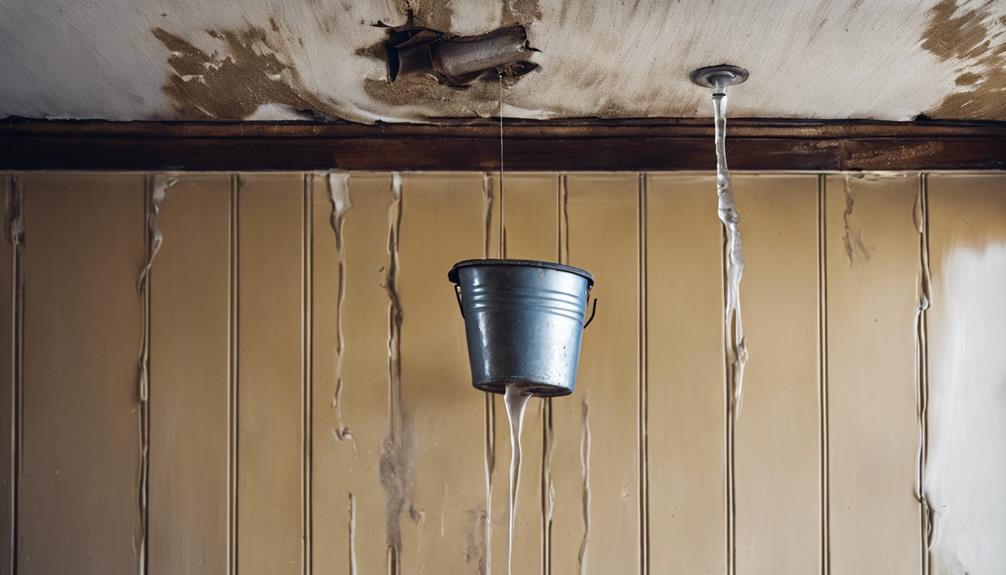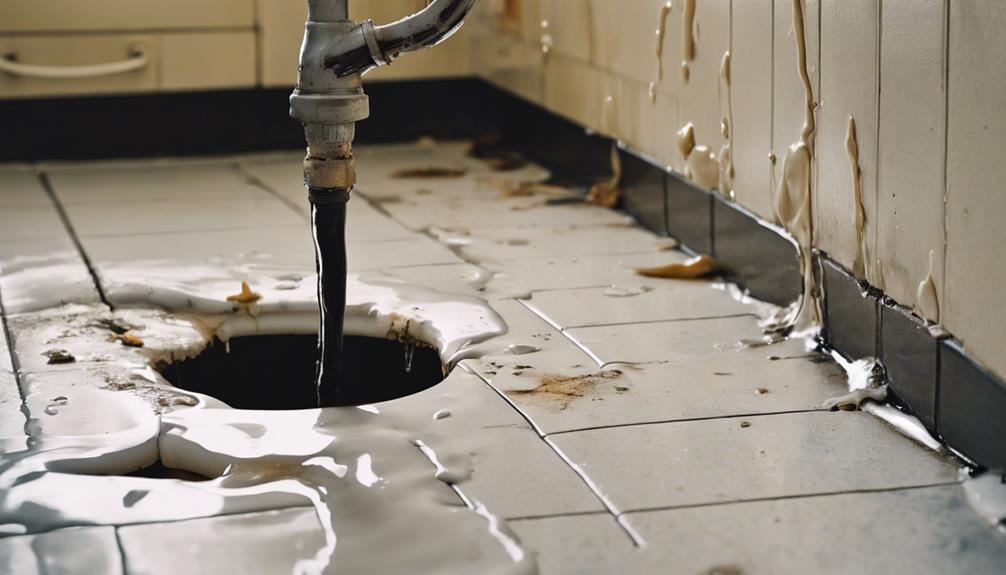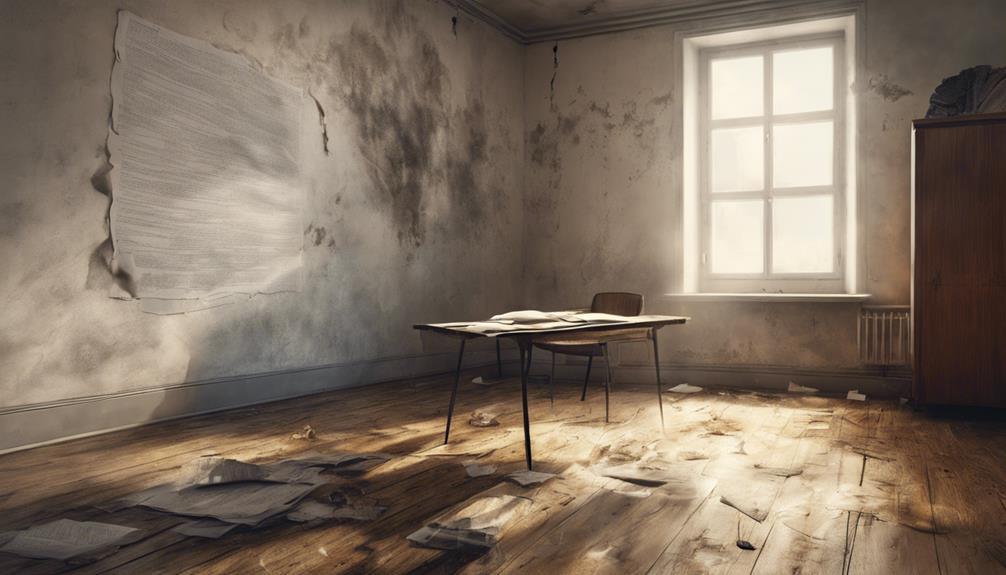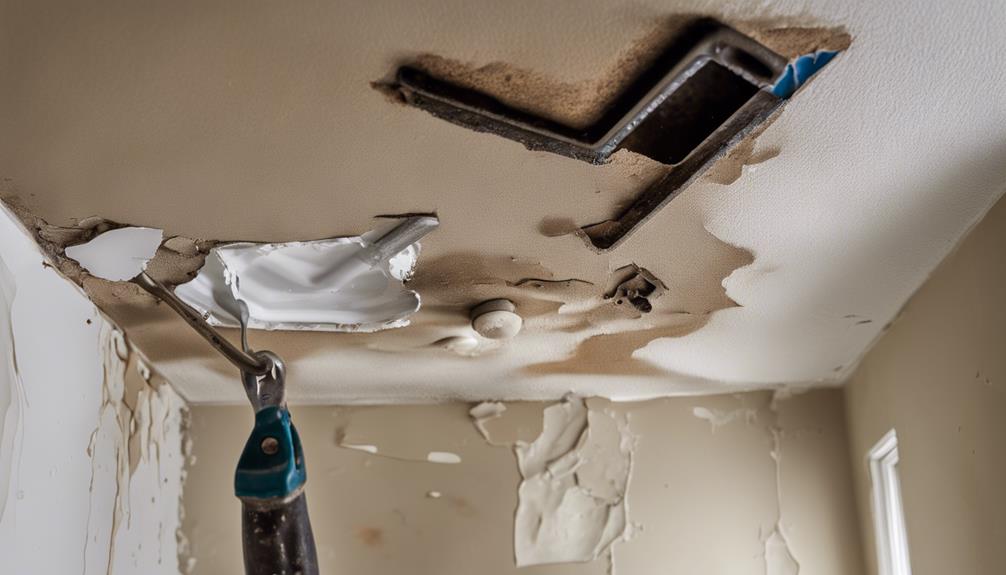
When it comes to water damage in your apartment, responsibility typically falls on both you and your landlord. Landlords must maintain habitable conditions and address repairs promptly, especially if the damage isn't your fault. If you notice water damage, notify your landlord right away to minimize further issues. You have rights, too; for serious damage that affects safety, you might be able to withhold rent or use the "repair and deduct" method. Keeping detailed documentation of communications is crucial. Understanding the nuances of these responsibilities can help protect your rights effectively. You might find more helpful insights on this topic.

When it comes to water damage in rental properties, landlords can't just brush it off; they've specific legal responsibilities to uphold. Under California law, landlords must maintain habitable living conditions, which includes addressing water damage issues promptly.
If you notice leaks or other water-related problems that aren't caused by your actions, it's the landlord's responsibility to handle the necessary repairs.
California Civil Code Sections 1941 and 1942 require landlords to fix these problems ideally within 30 days for non-urgent issues. Ignoring water damage can lead to serious consequences, such as structural damage and health risks like mold growth.
Landlords must act swiftly to mitigate these hazards to ensure tenant safety and compliance with lease agreements.
Failure to address water damage can lead to legal disputes over tenant rights and obligations. If you find that your landlord isn't taking action, document the issue and communicate your concerns clearly.
As a tenant, you have important rights and protections when it comes to water damage in your home.
It's crucial to report any issues promptly and understand your options for rent withholding if repairs aren't made.
Familiarizing yourself with your insurance coverage for water damage can further empower you to take action and ensure your living environment remains safe and habitable.
Knowing your rights can empower you to take action and ensure your living environment remains safe and habitable.
Understanding your rights as a tenant is essential, especially regarding water damage and the necessary repairs. In California, tenant protections ensure you have a habitable living environment, which includes timely repairs for issues like water damage not caused by your negligence.
If your landlord neglects significant issues, such as mold remediation, you can utilize the "repair and deduct" method. This allows you to fix the problem and subtract the cost from your rent.
When serious water damage renders your apartment uninhabitable, you have the right to withhold rent as long as you provide proper notice and documentation.
Remember, effective communication with landlords about water damage is crucial. It helps you establish a record of negligence, protecting your rights and responsibilities in potential disputes.
California law also allows you to abandon your rental unit if the necessary repairs exceed one month's rent, ensuring you're not forced to live in unsafe conditions.
Promptly reporting water damage issues is vital for protecting your rights as a tenant. When you notice any signs of water damage, it's your legal responsibility to notify your landlord immediately. This not only helps prevent further damage but also shields you from potential liability.
Under California law, landlords must maintain a habitable living environment, and failing to address serious water damage can lead to significant health and safety concerns.
Documenting water damage issues is crucial. Keep a record of your repair requests, including written communication and photographs of the damage. This documentation can serve as evidence if the situation escalates or if you need to demonstrate landlord negligence.
If your landlord doesn't act, California law gives you options. You might've the right to withhold rent or use the "repair and deduct" method for necessary repairs.
The right to withhold rent can empower tenants facing serious water damage that compromises their living conditions. In California, if your landlord neglects substantial issues affecting health or safety, you can legally withhold rent under California Civil Code Sections 1941 and 1942.
However, remember that this right is reserved for significant problems, like mold growth or structural concerns, not minor repairs.
Before you withhold rent, it's essential to provide written notice to your landlord about the water damage. Allow them a reasonable timeframe to address the issue.
If they fail to make repairs in that time, you might consider the "repair and deduct" option, where you can deduct repair costs from your rent. Just make sure to keep thorough documentation of all communications and repair requests with your landlord; this will be vital if disputes arise.
Always bear in mind that any tenant negligence on your part could undermine your position.

Water damage can wreak havoc on your living space, often stemming from several common causes. One major culprit is plumbing leaks, particularly from burst pipes, which can lead to substantial structural damage and costly repairs averaging around $3,362 per incident.
Roof leaks, often due to poor maintenance, can allow water to seep into walls and ceilings, increasing the risk of mold growth and potential health issues.
Appliance malfunctions, such as faulty dishwashers or washing machines, can also result in significant water accumulation, damaging your flooring and surrounding areas.
Additionally, flooding from external sources—like heavy rains or sewer backups—poses a risk to all ground-level units and may necessitate specialized remediation efforts.
Lastly, tenant negligence can exacerbate water damage. Leaving windows open during storms or failing to report leaks promptly can worsen the situation, complicating liability issues.
When you notice water damage, reporting it to your landlord quickly is essential to protect yourself from further liability.
Documenting the damage with photos and written communication creates a clear record that can be invaluable in disputes.
Make sure to detail the issue and keep a log of all your communications to ensure timely repairs and safeguard your rights.
Promptly reporting water damage is essential for minimizing further issues and protecting your rights as a tenant. When you notice water damage in your property, immediately contact your landlord to report the issue. This quick communication not only helps limit further damage but also establishes a record of the problem, which is crucial for any insurance claims or potential repairs.
Under California law, landlords must address urgent water damage repairs right away and non-urgent repairs within 30 days. So, it's vital to document everything. Take photos and write detailed descriptions of the damage, then submit this documentation to your landlord.
Keeping a log of all your communications regarding the water damage will create a timeline that shows you're proactive about resolving the issue.
If your landlord fails to act promptly, you may consider using the "repair and deduct" option, allowing you to handle urgent repairs yourself and deduct the costs from your rent. This option emphasizes the importance of timely reporting and highlights your rights as a tenant under the lease agreement.
Effective documentation is your best ally in managing water damage issues. When you promptly report water damage, it's essential to create a comprehensive record that can support your claims and repair requests.
Here's what you should do:
Timely documentation is crucial. Delays can complicate liability and lead to further damage or health risks, making your claims harder to support.
By effectively managing your documentation, you're not just protecting your rights; you're also ensuring that necessary repairs happen swiftly and efficiently.
Don't underestimate the power of well-organized documentation—it's your strongest tool in navigating the complexities of water damage situations.

In navigating disputes over water damage, clear communication often proves essential. Effective dispute resolution strategies can help you address issues with your landlord while ensuring your rights are protected. Start by documenting all communications and water damage incidents to create a clear timeline and establish responsibility for repairs.
Engaging in open dialogue with your landlord can facilitate quicker resolutions. If urgent repairs are necessary, consider utilizing the "repair and deduct" option, which allows you to address issues yourself and deduct the costs from your rent if your landlord fails to act promptly.
If discussions stall, mediation services can provide a neutral platform for both parties to discuss grievances and find mutually agreeable solutions without resorting to litigation. Familiarize yourself with tenant-landlord laws to reinforce your position and ensure you're aware of your rights and your landlord's obligations.
| Strategy | Description |
|---|---|
| Documenting | Keep records of all communications and incidents. |
| Open Dialogue | Communicate openly to resolve issues quickly. |
| Repair and Deduct | Address urgent repairs and deduct costs from rent. |
| Mediation Services | Use neutral services to find amicable solutions. |
Understanding your insurance coverage is crucial when it comes to water damage. Knowing what your policies cover can save you from financial headaches later on. Here are three key points to remember about insurance in a rental property:
When dealing with insurance claims, it's vital to review your renters insurance policy to ensure it covers various water-related incidents, including mold damage.
Understanding the differences between landlord insurance and your own policy can help you navigate these situations effectively, ensuring you're adequately protected against potential losses.

When water damage occurs, knowing who's responsible for repairs is key to resolving the issue efficiently. Landlords are responsible for repairing water damage that isn't caused by tenant negligence, ensuring your apartment remains habitable under California Civil Code.
The repair processes typically start with identifying and fixing the source of water damage, followed by mitigating further property damage.
As a tenant, it's crucial you report water damage promptly. Delaying notification can lead to liability for additional damages. Keep detailed documentation of all incidents, repair requests, and communications with your landlord. This record will help clarify responsibilities and streamline the repair process.
In cases of severe water damage, specialized contractors may be necessary. In such situations, landlords are responsible for coordinating these services to restore the property effectively.
In California, your landlord has specific obligations regarding water damage repairs. For emergency repairs, they must act immediately.
For non-urgent issues, they've got a 30-day timeline. Understanding your tenant rights is crucial.
If repairs aren't done on time, you can explore legal remedies, like "repair and deduct" or withholding rent.
Always document issues and refer to your lease agreements for clarity on maintenance responsibilities and insurance coverage related to water damage claims.
In Florida, your landlord's got specific repair timelines for water damage.
For emergency repairs affecting health and safety, they've gotta act within 7 days.
For non-urgent maintenance, you're looking at 15 days.
If they don't meet these obligations, know your tenant rights!
You can withhold rent or seek legal remedies.
Always document issues and follow your lease agreements.
Property inspections may also help support any insurance claims you might file.
When you encounter a water leak, understanding tenant rights and landlord obligations is crucial.
Typically, landlords must address leaks from structural issues, while you're responsible if negligence caused the problem.
Document everything for insurance claims and ensure you report leaks promptly to avoid legal liabilities.
Check your lease agreements for maintenance responsibilities and repair timelines.
In emergencies, follow procedures to mitigate property damage and safeguard your living space.
In Colorado, you might be responsible for water damage if negligence led to the issue.
Under Colorado laws, tenant liability arises when you ignore water leaks or fail to maintain appliances. Your lease agreement outlines maintenance obligations, while landlords must address repairs promptly.
Understanding your tenant rights is crucial; you can pursue repair timelines if they don't comply.
Also, check your insurance coverage, as it may help with water damage claims.
In the end, understanding who's responsible for water damage in your apartment can save you time and stress. Remember, landlords are typically accountable for major repairs, but tenants should report issues promptly. Always know your rights and protections, and keep communication open with your landlord. If disputes arise, don't hesitate to seek resolution strategies. Finally, check your insurance coverage, as it might help with unexpected costs. Being informed puts you in a better position to handle these situations.